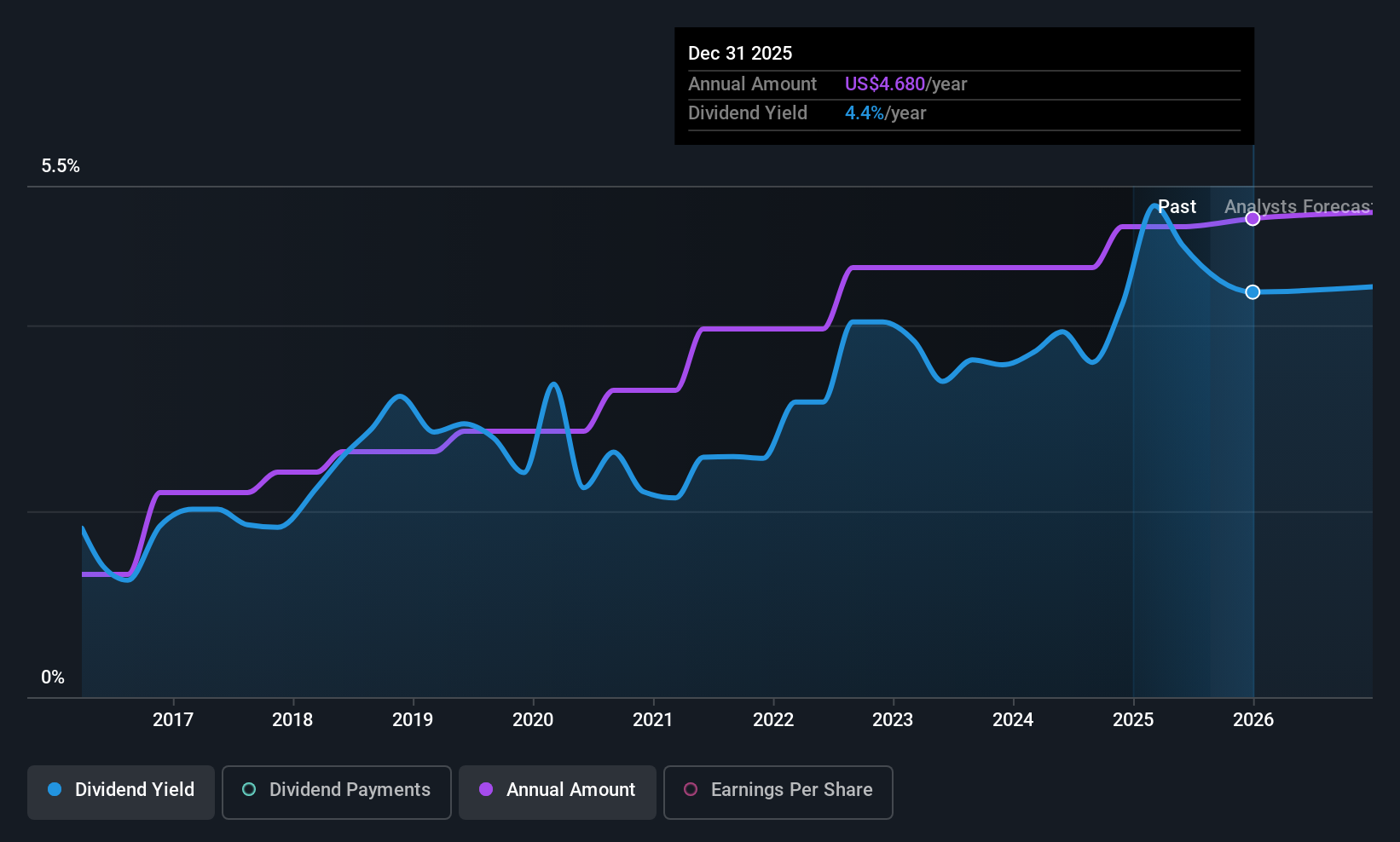LCI Industries (NYSE:LCII) Stock Goes Ex-Dividend In Just Four Days
Readers hoping to buy LCI Industries (NYSE:LCII) for its dividend will need to make their move shortly, as the stock is about to trade ex-dividend. Typically, the ex-dividend date is one business day before the record date, which is the date on which a company determines the shareholders eligible to receive a dividend. The ex-dividend date is of consequence because whenever a stock is bought or sold, the trade takes at least one business day to settle. Thus, you can purchase LCI Industries' shares before the 29th of August in order to receive the dividend, which the company will pay on the 12th of September.
The company's next dividend payment will be US$1.15 per share, and in the last 12 months, the company paid a total of US$4.60 per share. Looking at the last 12 months of distributions, LCI Industries has a trailing yield of approximately 4.3% on its current stock price of US$107.41. We love seeing companies pay a dividend, but it's also important to be sure that laying the golden eggs isn't going to kill our golden goose! So we need to investigate whether LCI Industries can afford its dividend, and if the dividend could grow.
Dividends are typically paid from company earnings. If a company pays more in dividends than it earned in profit, then the dividend could be unsustainable. It paid out 75% of its earnings as dividends last year, which is not unreasonable, but limits reinvestment in the business and leaves the dividend vulnerable to a business downturn. We'd be worried about the risk of a drop in earnings. A useful secondary check can be to evaluate whether LCI Industries generated enough free cash flow to afford its dividend. Fortunately, it paid out only 38% of its free cash flow in the past year.
It's positive to see that LCI Industries's dividend is covered by both profits and cash flow, since this is generally a sign that the dividend is sustainable, and a lower payout ratio usually suggests a greater margin of safety before the dividend gets cut.
View our latest analysis for LCI Industries
Click here to see the company's payout ratio, plus analyst estimates of its future dividends.

Have Earnings And Dividends Been Growing?
Stocks with flat earnings can still be attractive dividend payers, but it is important to be more conservative with your approach and demand a greater margin for safety when it comes to dividend sustainability. Investors love dividends, so if earnings fall and the dividend is reduced, expect a stock to be sold off heavily at the same time. That explains why we're not overly excited about LCI Industries's flat earnings over the past five years. It's better than seeing them drop, certainly, but over the long term, all of the best dividend stocks are able to meaningfully grow their earnings per share. A high payout ratio of 75% generally happens when a company can't find better uses for the cash. Combined with slim earnings growth in the past few years, LCI Industries could be signalling that its future growth prospects are thin.
The main way most investors will assess a company's dividend prospects is by checking the historical rate of dividend growth. Since the start of our data, nine years ago, LCI Industries has lifted its dividend by approximately 16% a year on average.
To Sum It Up
Has LCI Industries got what it takes to maintain its dividend payments? It's unfortunate that earnings per share have not grown, and we'd note that LCI Industries is paying out lower percentage of its cashflow than its profit, but overall the dividend looks well covered by earnings. In summary, it's hard to get excited about LCI Industries from a dividend perspective.
While it's tempting to invest in LCI Industries for the dividends alone, you should always be mindful of the risks involved. To help with this, we've discovered 1 warning sign for LCI Industries that you should be aware of before investing in their shares.
If you're in the market for strong dividend payers, we recommend checking our selection of top dividend stocks.
Have feedback on this article? Concerned about the content? Get in touch with us directly. Alternatively, email editorial-team (at) simplywallst.com.
This article by Simply Wall St is general in nature. We provide commentary based on historical data and analyst forecasts only using an unbiased methodology and our articles are not intended to be financial advice. It does not constitute a recommendation to buy or sell any stock, and does not take account of your objectives, or your financial situation. We aim to bring you long-term focused analysis driven by fundamental data. Note that our analysis may not factor in the latest price-sensitive company announcements or qualitative material. Simply Wall St has no position in any stocks mentioned.
 Wall Street Journal
Wall Street Journal